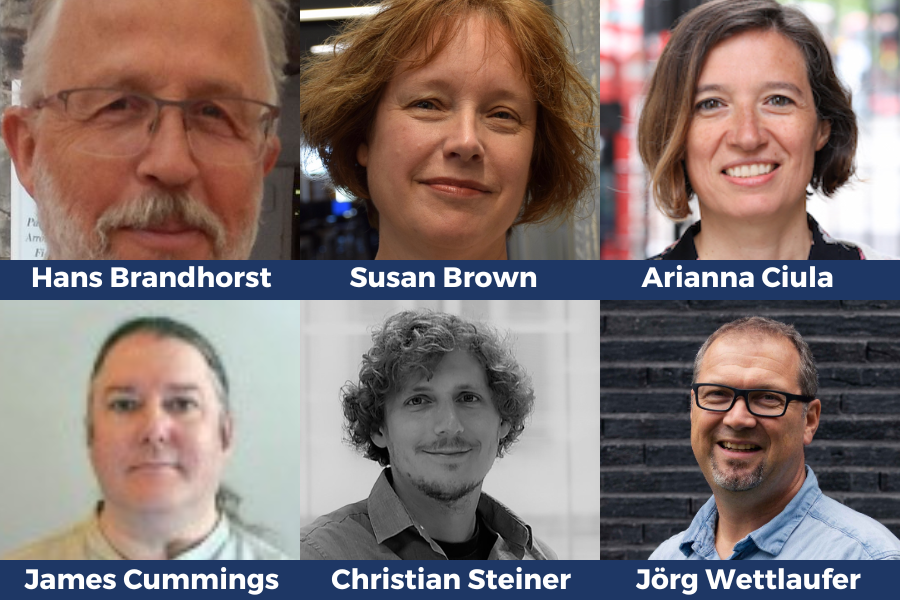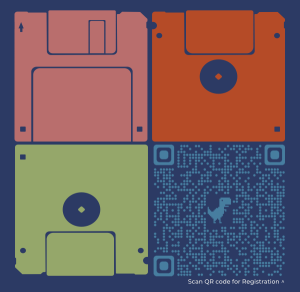
- This event has passed.
The Future is Now: A Symposium on Collaborating for Sustainability in Digital Research

Virtual Online Event on Friday, September 29, 9:30 am – 12:30 pm (EST)
This event is free, online, and open to all. Advanced registration is required, via zoom.
Download the PDF of the full program HERE
The Critical Digital Humanities Initiative (CDHI) warmly welcomes you to a virtual half-day symposium on collaborative efforts to ensure the sustainability of digital research. Digital scholarship is firmly established in the research landscape and many digital projects are used extensively with development spanning decades. However, the hurdles researchers confront in ensuring the enduring accessibility and functionality of their digital projects differ significantly from the challenges encountered during the initial creation of innovative digital tools.
The symposium will be an opportunity to explore the diverse strategies that digital humanities researchers use to ensure the lasting sustainability of their projects. We will explore inventive collaborations within the digital humanities community and spotlight approaches through which researchers in North America, the UK, and Europe have navigated the complexities of redesigning their projects for sustained accessibility and functionality in digital research.
Program
9:30 am
Welcome, access check, and land acknowledgement given by Danielle Taschereau Mamers
Introduction to Today’s Event, Claire Battershill
9:45–10:30 am, Panel A, moderated by James Ginther
Hans Brandhorst, Editor in Chief at Iconclass, “DIY Sustainability: The Iconclass Consortium”
Arianna Ciula, King’s College, England, “Overview on King’s Digital Lab Approach to Archiving and Sustainability: Context, Practices and Challenges”
Q&A (15 min)
10:30–11:15 am, Panel B, moderated by Claire Battershill
Jörg Wettlaufer, Academy of Sciences and Humanities in Lower Saxony, Germany, “Sustainability in the Digital Humanities: Some Insights from a German Research and Cultural Heritage Institution”
Christian Steiner, University of Graz, Austria, “A Roadmap for Accessibility, Stability, and Preservation using Linked Open Data und Institutional Repositories
Q&A (15 min)
11:15–12:00 pm Panel C, moderated by Teresa Wong
Susan Brown, University of Guelph, “Standards and Interoperability for Sustainability: The CWRC and LINCS Infrastructure Projects”
James Cummings, Newcastle, England, “Building for Failure: Embracing sustainability and principles for digital longevity in Digital Humanities”
Q&A (15 min)
12:15–12:30 pm
Reflection given by Harriet Sonne de Torrens
Concluding discussion moderated by Betsy Moss
Abstracts
Hans Brandhorst, DIY Sustainability: The Iconclass Consortium
The Iconclass classification system, initially released from 1972 to 1985 and later digitized, faces hidden challenges. Despite being a global standard for categorizing cultural content, it relies solely on volunteer efforts without financial backing. In 2021, the Henri van de Waal Foundation, named after the creator of Iconclass, was established. In 2022 the Foundation accomplished its first objective of updating the Iconclass Browser software. Now, their goal is to establish a Consortium for ongoing maintenance and enhancement. They seek to mobilize backing from the community of institutional and individual users, and more importantly they aim to foster true collaboration in the real, literal sense of working together. I will outline the Consortium’s initial collaboration strategy. Then, I shall outline some ideas for the development of an iconographic studies ecosystem that is richer than the classification itself.
Susan Brown, Standards and Interoperability for Sustainability: The CWRC and LINCS infrastructure projects
A long-standing digital humanities project that has been running since the 1990s led to the formation of two more general and connected collaborative infrastructure projects led by scholars and librarians. This presentation addresses the role of standards in supporting both interoperability and sustainability, and the challenges associated with producing truly FAIR (findable, accessible, interoperable, and reusable) data that has long-standing value for humanities research.
Arianna Ciula, Overview on King’s Digital Lab Approach to Archiving and Sustainability: Context, Practices and Challenges
This talk will summarize King’s Digital Lab approach to Archiving and Sustainability building on previous work by the team. It will offer (1) a summary of the context for the set-up of the Lab and its ethos of care around the legacy projects it inherited; (2) an introduction to the Lab’s Software Development Lifecycle to showcase how forward planning is integrated in current team’s practices as well as templates for ongoing and new projects; (3) an overview of current approaches around monitoring methods and governance policies. For more information see https://kdl.kcl.ac.uk/our-work/archiving-sustainability/
James Cummings, Building for Failure: Embracing sustainability and principles for digital longevity in Digital Humanities
The right time to prepare for the ending of your Digital Humanities project is as you are writing the funding bid. In this presentation, I implore digital humanities scholars to embrace the possibility of failure, viewing it as a driving force for sustaining digital resource creation. While open standards like TEI XML are prevalent, their implementation in project resources is inconsistent. Many projects feature database-backed websites, fashionable technologies, and sites lacking graceful degradation, demanding excessive maintenance even with static content. In building these sites under-resourced developers often resort to their familiar server-side technologies and easy libraries to complete work which could have been done in more sustainable ways with the pre-generation of static sites with client-side technology. I will discuss some of the pitfalls and benefits of aligning, where feasible, to the Endings Project’s “Principles for Digital Longevity.”
Christian Steiner, A Roadmap for Accessibility, Stability, and Preservation using Linked Open Data und Institutional Repositories
This presentation explores the challenges and solutions for ensuring the accessibility, stability, and long-term preservation of digital research projects. Addressing technical, financial, and human resource barriers, the talk lays out a comprehensive roadmap. It advocates the utilization of Linked Open Data for interoperability, Institutional Repositories for stable hosting, and Large Language Models for automated data management. The presentation also highlights collaborative strategies for securing funding and suggests options for intellectual property and data integrity post-research.
Jörg Wettlaufer, Sustainability in the Digital Humanities: Some Insights from a German Research and Cultural Heritage Institution
This presentation delves into sustainability in digital humanities, focusing on Germany’s NFDI (National Research Data Initiative). It examines innovative approaches taken by academic groups, covering resource sharing, standardization, and establishing long-term research data infrastructures. A crucial aspect is the use and challenges of Linked Open Data (LOD) for interoperability. Real-world cases highlight how LOD can be both an asset and obstacle for sustainability. The talk also explores options for long-term care and preservation of digital research resources, drawing on established commitment concepts from other domains. These models, akin to traditional religious orders, seek to maintain a collective commitment to preserving valuable digital resources and spark further discussion.
About our Speakers
Hans Brandhorst, Iconclass, Leiden University, Netherlands
Hans Brandhorst studied Art History at Leiden University, graduating in 1975, and began working with Iconclass in the 1980s. He has served as the editor of Iconclass for approximately 25 years, closely collaborating with the software developer of the Iconclass Browser Etienne Posthumus. Together, they co-founded the Arkyves website which is published by Brill Publishers. Hans has authored works on iconography and book history and serves as the editor of the online version of Kirschbaum’s Lexikon der christlichen Ikonographie. In 2021, he co-founded the Henri van de Waal Foundation with André van de Waal, the latter being Henri’s son.
Susan Brown, University of Guelph, Canada
Susan Brown is a Professor of English at the University of Guelph where she holds a Canada Research Chair in Collaborative Digital Scholarship. Her research explores semantic technologies, critical infrastructure studies and, through the Orlando Project, feminist literary history. She leads the Canadian Writing Research Collaboratory, a virtual research environment for literary and cultural studies in Canada, and the Linked Infrastructure for Networked Cultural Scholarship.
Arianna Ciula, King’s College, England
Arianna Ciula is the Director & Senior Research Software Analyst at the King’s Digital Lab, London. She has broad experience in digital humanities research and teaching, research management, and digital research infrastructures. She holds a PhD in Manuscript and Book Studies (digital palaeography, University of Siena), an MA in Applied Computing in the Humanities (King’s College London) and a BA Hons in Communication sciences (computational linguistics, University of Siena).
James Cummings, Newcastle University, England
James Cummings is the Reader in Digital Textual Studies and Late-Medieval Literature at the School of English Literature, Language, and Linguistics at Newcastle University. He studies digital editing and late-medieval drama. He has been closely involved with the Text Encoding Initiative Consortium for over two decades, and occasionally writes about issues relating to TEI-based DH projects. While working at the University of Oxford he founded the DHOxSS training event and DH Awards grassroots DH awareness-raising opportunity. He is on the REED Project executive board and directed Digital Medievalist (2009-12). James has a BA in Medieval Studies (University of Toronto), an MA in Medieval Studies (University of Leeds), and a PhD in medieval drama (University of Leeds).
Christian Steiner, University of Graz, Germany
Christian Steiner has been a Research Assistant at the Centre for Information Modelling (ZIM) at the University of Graz since 2012. With academic foundations in Translation and Digital Humanities, his primary focus is on Semantic Web technologies, Linked Data, and Web Programming. His ongoing PhD project scrutinizes the efficacy of Wikidata as a bridging platform between the Life Sciences and the Humanities. Christian Steiner is also a dedicated educator, teaching university classes in these specialized domains. In 2022, he co-founded Digital Humanities Craft, a DH/IT venture, with Christopher Pollin.
Jörg Wettlaufer, Academy of Sciences and Humanities in Lower Saxony, Germany
Jörg Wettlaufer is a distinguished scholar and researcher at the Academy of Sciences and Humanities in Lower Saxony, Germany. With a background in history, law, and interdisciplinary studies, Dr. Wettlaufer specializes in medieval and early modern legal history, archival science, and digital humanities. He has contributed extensively to academic journals and has several books to his name that explore the complex interplay between legal traditions, societal norms, and technological advances. Over the years, Dr. Wettlaufer has been involved in numerous collaborative research projects, both nationally and internationally. His research has been pivotal in bridging gaps between traditional historical methodologies and emerging digital technologies. Through his work for the Academy, Dr. Wettlaufer plays a crucial role in shaping research agendas, mentoring young scholars, and promoting interdisciplinary dialogues. His work embodies the Academy’s commitment to advancing knowledge and fostering innovation, making him a vital asset to the academic community in Lower Saxony and beyond.
This event is free, online, and open to all. Advanced registration is required, via zoom.
An edited recording of the presentations will be shared on our YouTube channel.

